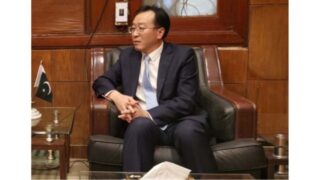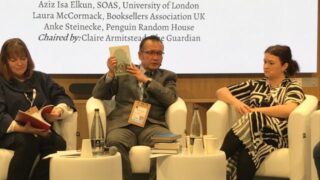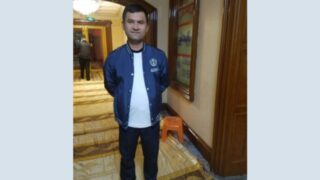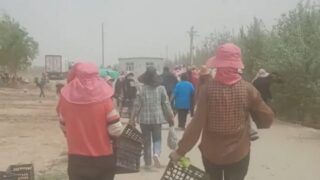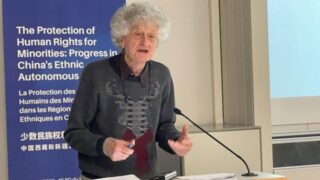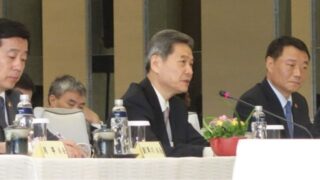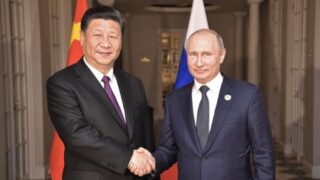The iconic image of a crying female detainee in a Xinjiang camp has moved the world. For the Uyghurs, her tears have a deeper meaning.
by Kok Bayraq
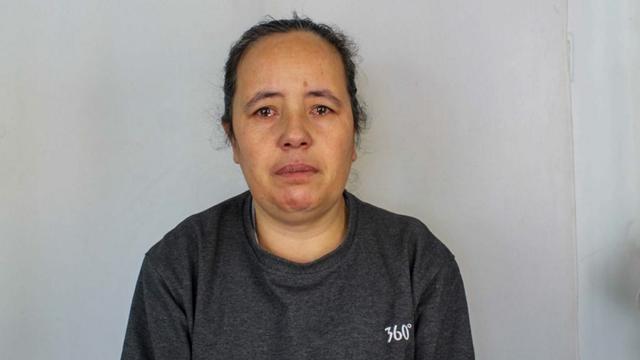

“I can feel Hawagul’s pain through her eyes,” said Afzal Khan, a British MP who saw a picture of Hawagul Tewekkul, a female detainee, in the Xinjiang Police Files. This is a common feeling about the iconic picture these days. However, when viewed by a Uyghur journalist, there are specific meanings of these tears.
In 2018, a police officer at the Tokkuzak Vocational Training Center (VTC) answered a reporter’s question: “What are the requirements for ‘students’ when meeting with family members onscreen?”
The officer answered, “One of the key requirements is that they should not cry.”
“What are the consequences of crying?” asked the reporter.
“Points will be deducted, the length of ‘training’ will be extended, and there will be no more meetings with relatives,” said the officer.
Notably, in the iconic picture, tears are not only a manifestation of anguish in that moment. Hawagul had been punished for days, including being permanently banned from meeting with family members.
Camp survivor Gulzira Auelkhan, who now lives in the USA, said in a testimony in 2019 that detainees in the camps were not allowed to cry. If they did, they would face the wall or the ground to avoid being seen by cameras. If caught crying, they were sent to a darkened cell for twenty-four hours. Hawagul’s tears indicated that she had stayed in a blackened cell at least once, and had endured severe torture in jail.
In 2012, when the Turkish president visited Urumchi, Patigul Ghulam, a mother searching for her son, was placed on house because she was crying in front of a crowd. She faced the same punishment when a Turkish opposition leader visited Urumqi later in 2012, even though she said nothing but just had tears in her eyes while looking at foreign visitors.
The punishment continued into 2014, during the “strike hard” campaign against “terrorists.” She was imprisoned for two years and charged with leaking state secrets simply for crying in public. In 2017, she was imprisoned again for her “past crimes.”
Hawagul’s tears are a sign that she may have been sentenced to 10–15 years in prison when the “vocational training centers” “closed” and “students graduated” in 2019.
Patigul Ghulam said at the time, “Syrian mothers are happier than me; they can have the bodies of their children. Palestinian mothers are happier [because] they can cry when they are in pain.”
The picture of Hawagul in tears may show the only comfort she had that day because she released her pain.
When a reporter said to Patigul Ghulam, “I don’t want to make you cry a lot, but let’s have this last conversation,” she replied, “Don’t do that; tears are my last and only weapon, and I take revenge on the killers who ate my child by exposing their criminal record with my tears.“
Hawagul’s tears may also be weapons. By leveraging them, she may be saying, “The place where I am staying is a jail, not [a] training center. You are punishing me, not educating [me].” She may also be saying, “It is a lie to say that all people in Xinjiang ‘are united as closely as the seeds of a pomegranate’; you are destroying us,” and “my homeland [of] East Turkestan was not part of China; you [have] forcibly occupied it.”
It is well known that crying, which is usually a means of relieving pain for human beings, is a crime in East Turkestan. Crying is sometimes a means of appealing to others. Given Xi Jinping’s “no mercy” order, appeals by the Uyghurs are useless tools that would not affect China. Hawagul, as a victim of and witness to the detainment of millions of innocent people, should know that appeals will not work in that moment. Thus, via her tears, she may pray to God (Allah), saying, “We have no helper in the world other than you. Please stop the trials and end this oppression, not for myself but for the sake of my children and the health of their faith.”
Uyghurs have a proverb: “Awls can’t be hidden in a bag.” Despite hosting high-level but misleading visitors, such as Commissioner Bachelet, corrupt officials have mounted propaganda that is supported by purchased experts, such as Alena Dohan; Hawagul’s tears have highlighted what the “vocational training centers” really are and how the Uyghur genocide is continuing.
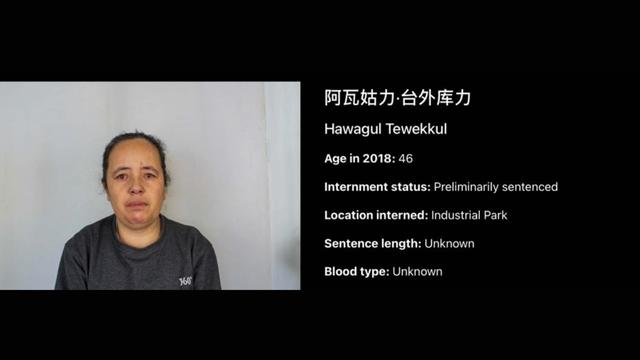

Hawagul’s tears are not only an indication of her pain, but also valves of the national will of the Uyghurs, who refuse to embrace a Chinese identity; a symbol of a dissident political view and stance against the oppression; an awl of the truth that exposes secrets and atrocities, a tool of the ordinary people defending themselves from, and fighting against, a genocide.
As an arrogant power in today’s world, China ignores this weapon and mocks the international community by all pieces of evidence, calling them “rumors.” Human history has witnessed many arrogant powers fall when trying to compete with God. Thus, Hawagul’s weapon—tears given by God—cannot be imitated, stolen, or confiscated. China is doomed to collapse, not because of a US’s missile attack, Russia’s atomic bomb, or the EU’s embargo or an accidental nuclear test by North Korea—but because Hawagul’s tears, and their nature as a God-given weapon.



